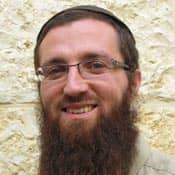The story is told of a person who was traveling through Europe. He came across a town in which there lived a very well known Kabbalist. The traveler figured he would take advantage of his short time in the town, and would make a point of visiting with this Kabbalist. When the traveler entered the house of this great mystical sage, he was astounded. All that was in his house was a table, a bed, and some books. Nothing more. He asked in amazement, "This is all you have here? How do you live like this?" The Kabbalist answered him, "What about you? All you have is those few things that are in your bag." The traveler responded, "Yes, but I am only on a journey, temporarily passing through." The Kabbalist replied, "I am also only on a journey, temporarily passing through."
If we want to understand what it truly means to take a spiritual journey, we can learn a lot from the first documented spiritual journey in all of human history: the journey of Abraham.
Abraham's Journey
The first time God makes a prophetic appearance in Abraham's life, God tells Abraham: "Go, to yourself, from your land, and from your birthplace, and from your father's house, to the land that I will show you."
If we take a close look at this verse, a number of things don't seem to sit right. First of all, the verse begins with a very strange phrase: "Go to yourself." What does that mean and what can we learn from it? Furthermore, God tells Abraham to leave his land, his birthplace, and his father's house. Why list all three? Couldn't God get the message across with, "Hey Abe, it's time for you to leave your land"? After all, his birthplace and his father's house are included within his land. Is God just trying to rub it in and make it more painful? And even if God wants to list all three of them individually for whatever reason, why in that order? Isn't it backward? Should the verse not read "father's house, birthplace, land"? When I took God up on this verse and moved to Israel, I initially left Teaneck, New Jersey, then the New York/New Jersey region, and then the United States of America. The way this verse appears, it is as if God said to me, "Eliyahu, leave the U.S.A., the New York area, and your house in Teaneck." Why tell me to leave New York or Teaneck if I'm already out of the country?
Unique Potential
The Kabbalists teach that this verse can instill within a person a deep sense of individuality. As mentioned, all that happens to us and all that we are born with has been custom designed to our unique soul in order that we make choices in life under those specific conditions. Some people are born into wealthy families; others are born into poor families. Some are born into a more religiously observant environment; others are born into a completely secular surrounding. Some people grow up in stable, healthy homes while others grow up in broken dysfunctional ones. Each one of us is given exactly what we need to be given in order to achieve what we need to achieve through making the choices we need to make under these specific circumstances. The idea of "go to yourself" mentioned in the Torah means to go toward one's unique potential—the reality of who you can be.
Getting a Foot Out the Door
How do we get there? How can we succeed in actualizing the potential that is hidden within us? God's message to Abraham is that the prerequisite to getting to one's inner potential and purpose is to first leave "from your land, from your birthplace, and from your father's house." The meaning of this, teach the Kabbalists, goes much deeper than the physical land, birthplace, and house we grew up in. It means that in order to get started on our true spiritual path, we must first gain a sense of clarity and objectivity. The only way to do that is to do whatever is necessary to uproot from within ourselves any form of subjectivity and false beliefs about the world and ourselves we may have acquired up until now.
Recently, my wife and I were running a Shabbat program for fifty 20-something Jews with minimum exposure to Judaism. In one of the sessions, I discussed with them the idea of taking a step back from preconceived norms and beliefs to ask oneself, "Why do I believe this?" After the session, a girl came to talk to me. She explained that since she grew up without any religion, when she studied the different religions in university, she was doing it as a "clean slate."
Besides making the fundamental point to her that if she wants to really hear what any religion has to say she ought to go to a believer and not a professor, I proceeded to list off a number of different beliefs that I knew she'd hold (i.e., "Do whatever you want as long as it doesn't hurt anyone else"; "Democracy is the only legitimate brand of government," etc.) and asked her why she believed in these things as universal truths. Her reply to me perfectly portrayed the point I was trying to make. She said that her beliefs were simply natural and obvious. Herein lies the problem.
What is "natural and obvious" to this Florida born-and-bred 20-something in the year 2006 was not nearly as "natural" nor as "obvious" to the Florida born-and-bred 20-something of the year 1006. This leads us to one conclusion. Neither the beliefs of the 1006-er nor the beliefs of the 2006-er are necessarily "natural and obvious." If we have a feeling that something is naturally correct, it can be because it is in fact spiritually intrinsically true, or because we have been conditioned to the point that we feel that way. The important thing is to find out.
3/14/2012 4:00:00 AM





